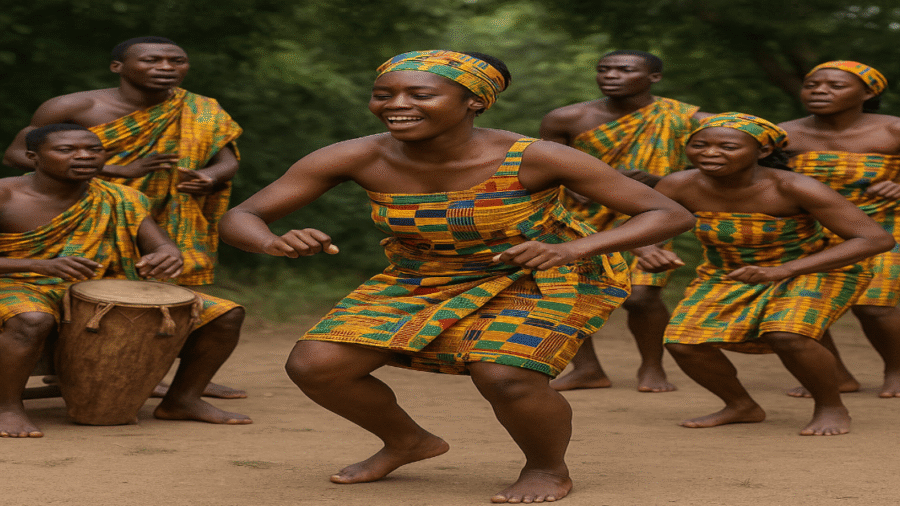People often view dancing as something skillful that must be mastered for performance or entertainment purposes only. But in reality, the benefit of dancing stretches far beyond the stage. Dancing is not just a fun way to move your body. It has also been recognised as a powerful tool for enhancing mental well-being, releasing emotions and building confidence.
Although professional dancers spend years mastering their steps, rhythms, and expressions, one does not need to be a professional dancer to experience the powerful effects of dance. Even a few moments of the body, whether in a bedroom, kitchen, or garden, can be extremely therapeutic; it can help release emotional tension, lift your spirit, and restore mental clarity.
In this post, we will break down how dancing benefits your psychological well-being based on data, not just rhythm.

Why is Dance Good?
1. Dancing Enhances Physical Health
Did you know that dancing for just 30 minutes can burn more than 300 calories?
Dancing is a fun and effective way to stay active and improve your physical fitness. Dancing helps build strength and flexibility. It also boosts cardiovascular health by helping lower blood pressure, reduce cholesterol levels, helps strengthen bones and muscles and boost overall stamina.
Dancing also helps release lots of energy, promoting relaxation and leading to deeper and longer sleep. This in turn, benefits the body, helping you look and feel your best.
2. Improves Mental Wellbeing
Did you know that dancing to simple music after a long, stressful day can go a long way in helping you unwind, relax, refresh, and let go of any worries or tension?
Research shows that dancing reduces stress, anxiety, and depression, while increasing feelings of happiness and well-being. When you dance, your brain releases feel-good chemicals like dopamine, serotonin, endorphins, and oxytocin into your brain. These are the same neurochemicals associated with happiness, bonding, and stress relief. They act as natural painkillers and mood boosters, promoting relaxation, reducing stress, and improving your overall mood.

3. Helps Boosts Cognitive Function and Memory
Dancing puts your cognition to rest and allows the brain to focus better and process information more efficiently. Researchers have found that as dancing reduces stress, it improves memory performance by lowering the level of the stress hormone cortisol which can interfere with memory and learning.
Dancing again helps improve multi-tasking and decision making. As you dance, you try to process the beat of the song and adjust your bodies to match its rhythm. Your brain also engages in these same actions to help boost mental flexibility; a skill linked to intelligence and problem-solving abilities.
So, the next time you are cognitively tired, and your brain has done so much studying, you can release it off with a quick dance.
4. Improves Self-Esteem and Confidence
Have you realised that when you immerse yourself in dancing, you do not experience any self-doubt or body concerns in that moment?
Dancing serve as a means to achieve healthy levels of self-esteem. It gives form to emotions you cannot always put into words. It is a language of its own, one that helps people process grief, joy, anger, or love. Through movement, you can access the unconscious and reconnect with our inner world.
Also, if you are able to master dancing on your own, you have the confidence to dance among people anywhere.
5. Social Bonding and Community Healing Through Dance
Ever wonder why people naturally dance together at celebrations or gatherings?
Dance is innately social as it helps create several bond and inclusion. People from different backgrounds typically come together to form a bond in a dance group where they can easily bond and make friends. For people struggling with loneliness, dance groups and classes offer a safe, expressive space for human connection.

Dance Across Cultures: A Universal Language for Healing
Movement is universal. Almost every culture uses dance as part of their rituals and rites of passages and healing processes. You do not need to speak the same language to feel a person’s joy or grief when they dance.
Ghanaian and other traditional cultures do not see dancing as form of entertainment only but a medicine for the spirit. It helps release emotions, calm the mind, energise the body, and restore spiritual balance. Modern psychology is catching up, with more therapists incorporating dance into trauma recovery protocols.

Move Your Body, Free Your Mind
As we navigate the complexities of modern life, integrating dance into our routines can serve as a vital tool for self-care and mental well-being.
Dancing is a powerful psychological tool accessible, affordable, and deeply human. Whether you are struggling with anxiety, looking for creative release, or just wanting to reconnect with your joy, dancing can be your medicine. Either you are dancing alone in your room, joining a group class, or participating in a cultural dance celebration, the transformative power of dance is undeniable.
So next time you hear music, let yourself move. Your mind and soul will thank you, not only for the joy it brings in the moment. But also, for the profound and enduring benefits it offers to our minds and soul.



[…] Movement like dance activates dopamine pathways, improving both mood and vitality through shared joy. See more in Why Dancing is Good for the Mind and Soul. […]
[…] or living room—improves circulation, releases endorphins, and reconnects you with joy. In Why Dancing is Good for the Mind and Soul, you will find how even a few minutes of spontaneous dance can increase mental clarity and reduce […]
[…] Why Dancing is Good for the Mind and Soul, you will learn how moving your body to music raises your spirits, releases endorphins, and […]